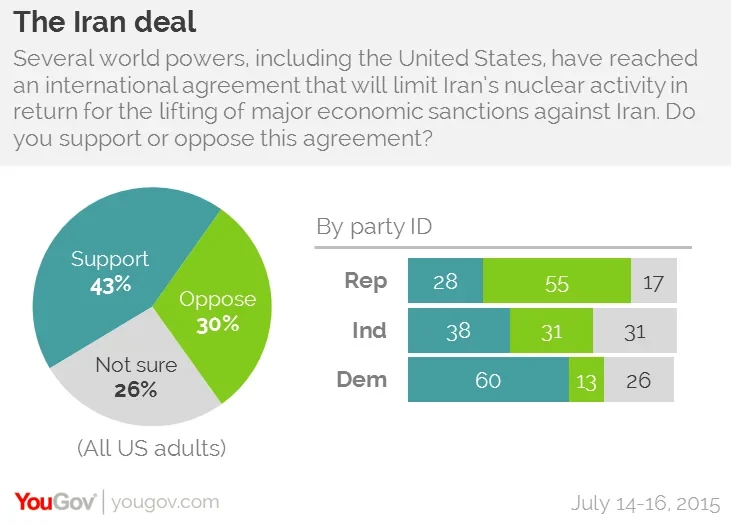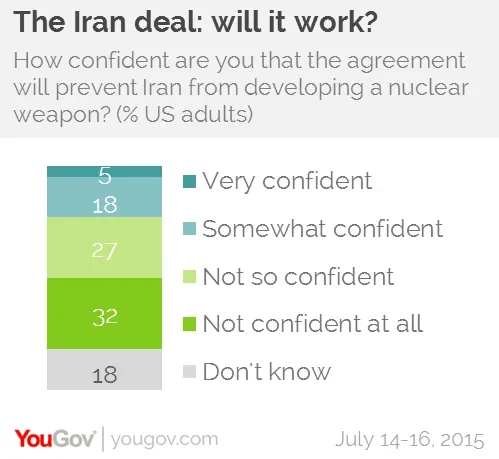In principle Americans support the deal by 43% to 30% – even though a majority lack the confidence it will prevent Iran from acquiring a nuclear weapon
On Tuesday negotiators from six world powers and Iran announced an historic agreement to limit Iran’s nuclear activity in return for the lifting of major sanctions that have crippled the Iranian economy. President Barack Obama has already embarked on an effort to sell the agreement to Congress and the American public, who, according to a new YouGov poll, are supportive, even while harboring real doubts about the deal's ability to prevent Iran from developing a nuclear weapon.
Overall, 43% of Americans support the deal. This falls short of a majority, but supporters significantly outnumber opponents of the deal, who make up 30% of the public. Fully a quarter of Americans (26%) are undecided, however.

Support for the deal falls along familiar political lines. 60% of Democrats back the agreement, which could mark a major legacy acheivement for a Democratic president. 55% of Republicans oppose the deal. Yet Republicans are more likely to support the Iran deal (28%) than Democrats are to oppose (13%), and independents are narrowly in favor (38-31%) with 31% undecided.
Americans also tend to think Iran, not the U.S. and its allies, got the most out of the deal, by 38% to 11%. 20% say both got about the same amount – the “win-win” described by Iran’s foreign minister after the deal was announced.
If Iran breaks the agreement and begins developing a nuclear weapon, majorities of nearly all political and demographic groups say they would approve of the US and its allies taking military action against Iran. Overall 64% say they would approve of using military force in this event, against only 18% who would disapprove.
And if public confidence in the deal is an indication, support for military action may soon be tested. Only 23% of Americans are even somewhat confident the deal will prevent Iran from developing a nuclear weapon, while 27% are “not so confident” and another third are “not confident at all”.

These numbers are consistent with findings before the agreement was announced that showed Americans in favor of negotiations but also distrustful that Iran would keep up with their end of a bargain.
German public supportive
YouGov asked the same questions of the German public, and found them much more favorable to the agreement with Iran.
Germany was a partner to the United States in the nearly two-year long negotiations, along with China, Russia, France and the United Kingdom.
Overall, 63% of Germans support the deal to curb Iran’s nuclear program, while only 18% oppose it and 20% don't know.
This is despite pessimism about whether the deal will work out. 40% of Germans are confident the deal will prevent Iran from acquiring a nuclear weapon; 46% are not.
However, only 36% of Germans believe Iran’s nuclear program poses more than a minor threat to Germany, compared to 54% of Americans who see a serious threat to the United States. A quarter of Germans surveyed consider Iran an ally (3%) or a friendly state (21%).
German survey conducted as part of the YouGov Germany Omnibus. 1380 German adults were interviewed online. The figures have been weighted and are representative of all adults.
PA image
Full US poll results can be found here and topline results and margin of error here.









